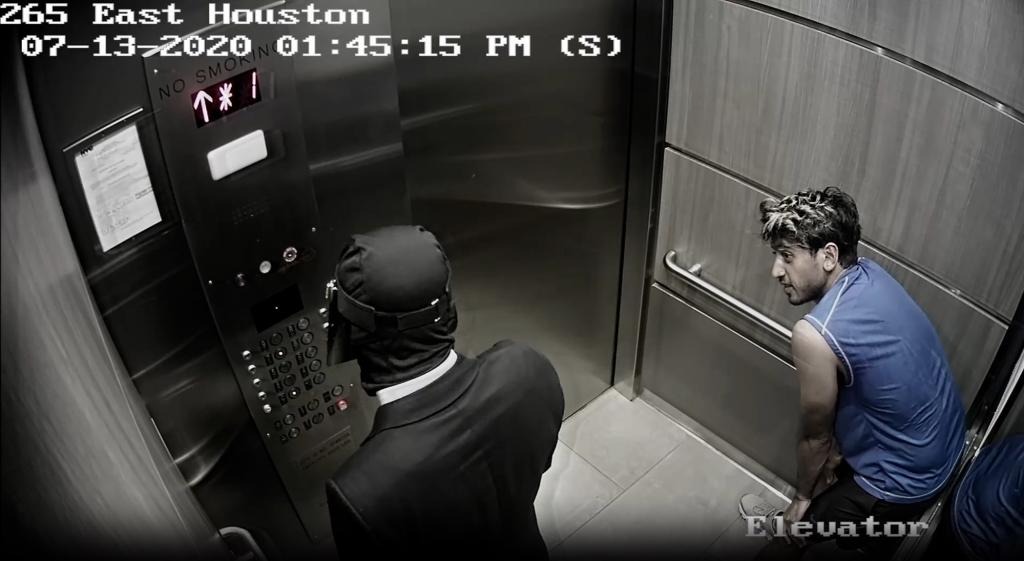On 14/7/2020, Fahim Saleh’s sister went to check on the 33-year-old tech CEO at his luxury seventh-floor apartment in Manhattan after not being able to reach him for 24 hours. She had a key and used the private elevator that led directly to his $2.2 million apartment. Upon entering, she made the horrific discovery of his dismembered body.
Police were shocked by the brutality of the crime scene and its unusual cleanliness, indicating a premeditated and carefully planned attack.
A masked assailant
Saleh, a Bangladeshi national born in Saudi Arabia and raised in New York, had chosen Manhattan as the base for his global tech ventures. He was known for creating PrankDial, a prank call service, and Gokada, a ride-hailing app.
Surveillance footage from the building captured Saleh’s final moments and revealed a suspicious individual dressed entirely in black lurking in the lobby.
On the morning of 13/7/2020, Saleh returned from a jog and entered the elevator, followed by the masked man. As the elevator doors opened on the seventh floor, the assailant used a taser to subdue Saleh, causing him to collapse. The elevator doors then closed.
 |
Elevator surveillance footage captured a masked figure in black following Fahim Saleh on the morning of 13/7/2020. Photo: Manhattan District Attorney's Office |
Footage from the building's lobby confirmed the premeditated nature of the attack. Five hours prior, the suspect entered the lobby and waited in a corner for Saleh.
Reviewing security footage from a building across the street, police identified the suspect entering that building as well. A man matching the suspect’s description had inquired about an apartment there.
Amidst the Covid-19 pandemic, real estate agents in that building allowed prospective tenants to view apartments using key codes. Police found a home security camera installed in the vacant apartment, pointed directly at Saleh’s residence. They determined the suspect had been monitoring Saleh’s movements from this vantage point via his phone.
Investigators focused on street-facing security cameras in Saleh’s building and spotted a man resembling the suspect wearing sunglasses and a partially obscuring face mask.
When shown the image, Saleh’s family identified the man as 21-year-old Tyrese Haspil, Saleh’s former personal assistant.
A greedy assistant
Described as intelligent and ambitious, Haspil had started his own businesses at a young age. In May 2018, Saleh hired him as his personal assistant to handle finances and personal matters.
This access allowed Haspil to steal from Saleh’s accounts. He created a PayPal account and a business bank account to transfer Saleh’s money to himself. Haspil also fabricated reports and used aliases similar to other financial transactions to conceal his actions for over a year.
The total amount stolen reached $95,000. Upon discovering the theft in May 2019, Saleh fired Haspil. Instead of pressing charges, Saleh and his lawyer arranged a repayment plan. Haspil never repaid the money.
In the elevator surveillance video, police observed the suspect vacuuming up tiny pieces of paper, known as AFIDs, discharged from the taser. AFIDs have unique serial numbers corresponding to specific tasers, enabling authorities to trace the weapon back to the purchaser.
After thoroughly examining the elevator and crime scene, police found an AFID fragment, tracing the taser to Haspil. While the taser was never recovered, they obtained evidence of Haspil using Saleh’s credit card after the murder to purchase balloons and rent an Airbnb for his girlfriend's birthday.
Multiple murder attempts
On 17/7/2020, Haspil was arrested at the Airbnb and charged with murder. Police determined he had stolen nearly $400,000 from Saleh. His phone's search history revealed he had been planning the murder even before being fired.
In October 2020, Haspil pleaded not guilty to first-degree murder. Due to Covid-19, the trial was delayed until May 2024.
Haspil testified before a grand jury that he had lied about his work experience on his resume to get hired by Saleh. He had previously been fired from a Long Island restaurant for embezzling $20,000.
Haspil also claimed he needed money to impress his French girlfriend and provide her with a lavish lifestyle.
Prosecutors stated that on 13/7/2020, Haspil was seen on surveillance footage entering Saleh's building and following him into the elevator. When Saleh exited the elevator to enter his apartment, Haspil tased him in the back and then fatally stabbed him multiple times.
The following day, Haspil returned to the apartment with an electric saw purchased with Saleh’s credit card from a local hardware store. He dismembered Saleh’s body, placing the remains in large garbage bags he had pre-ordered. He left the apartment to find a battery charger for the saw and did not return after discovering the police had been called.
Haspil’s internet search history in the days following the murder revealed searches for "body," "Fahim Saleh," and "NYC tech CEO murder."
According to prosecutors, Haspil’s motive stemmed from financial reasons. He hadn't repaid the embezzled funds and continued to steal more. In an attempt to cover up the theft and prevent Saleh from testifying against him, Haspil had plotted to kill Saleh at least three times before carrying out the murder in July 2020.
Despite knowing Haspil had stolen from him to fund an extravagant lifestyle, Saleh gave him a second chance, only to be repaid with this brutal act of betrayal.
 |
Tyrese Haspil appears in court in New York, 2024. Photo: NYP |
In July 2024, the New York State Supreme Court found Haspil guilty of first-degree murder, second-degree grand larceny, and other charges.
In a surprising courtroom turn, Haspil contradicted his own defense attorney. After listening to his lawyer argue for nearly an hour that the 50-year-to-life sentence proposed by prosecutors was too harsh, Haspil requested to speak.
“Unlike my attorney, I think anything less than a life sentence without parole is inappropriate," Haspil told the judge.
In September 2024, Haspil was sentenced to life in prison with a minimum of 40 years before being eligible for parole.
Tue Anh (according to Oxygen, People, NYP)












